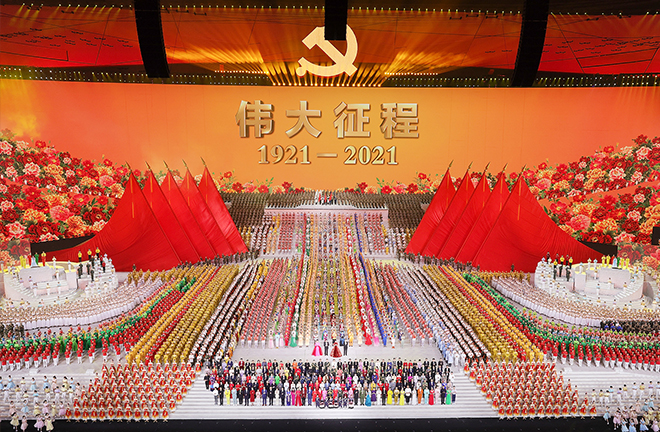Scholars look back on CPC’s 100-year history

An art performance titled “The Great Journey” is held to celebrate the CPC’s centennial at the National Stadium in Beijing, on the evening of June 28. Photo: CFP
Xi Jinping, general secretary of the Communist Party of China (CPC) Central Committee, called on members of the CPC to draw strength from the Party’s history and strive for China’s modernization and national rejuvenation.
Xi made the remarks on June 18 when visiting an exhibition on the history of the CPC in Beijing. The visit comes less than two weeks before the CPC’s centenary on July 1.
Themed “staying true to the founding mission,” the exhibition debuted on June 18 at the newly inaugurated Museum of the CPC in Beijing ahead of the CPC centenary.
Founding mission
The modern history of China started with the Opium War in 1840, which ushered in an era of semi-colonial and semi-feudal society in China. In order to overcome the tragic national humiliation, the Chinese people, including countless citizens with lofty ideals, carried out strenuous exploration and indomitable struggle, said Wang Zhenzhong, a Member of the Chinese Academy of Social Sciences (CASS).
The feudal ruling class launched the Westernization Movement, the peasant class launched the Taiping Heavenly Kingdom Movement and the Boxer Rebellion, and the bourgeois reformers and revolutionaries successively launched the Reform Movement of 1898 and the Revolution of 1911. However, they all failed. Only the CPC succeeded in leading the Chinese people to establish a new China, Wang noted.
The May Fourth Movement of 1919 promoted the widespread dissemination of Marxism in China and made ideological preparations for the CPC’s founding, said Qu Qingshan, head of the Institute of Party History and Literature of the CPC Central Committee. In 1921, the CPC was established, and stepped onto the historical stage leading the Chinese nation to rejuvenation.
Since its establishment, the CPC has taken the realization of communism as its highest ideal and ultimate goal, while maintaining the original aspiration and the mission to seek happiness for the Chinese people and rejuvenation for the Chinese nation.
People first
The CPC comes from the people, roots in the people, and serves the people.
Over the 100-year course of magnificent struggle, the CPC has been able to grow from small to large, from weak to strong, crossing one hurdle after another, and achieving great victories one after another, said Gan Hui, chairman of the Shaanxi Provincial Federation of Social Science Associations.
“The important reason lies in always basing efforts on the interests of the people, always maintaining flesh-and-blood ties with the people, deeply rooted in the people,” Gan said.
Du Linyuan, dean of the School of History and Culture at Yan’an University, said that the support of the people is the unfailing source of the CPC’s strength. The Party’s power comes from the people.
You Xuqun, president of Shaanxi Normal University, said that the CPC leads the Chinese people to create, uphold, and develop socialism with Chinese characteristics, leads the Chinese nation to a great rejuvenation, and practices a people-centered philosophy of development. This embodies the fundamental purpose of serving the people wholeheartedly, and also upholds a view of historical materialism where the people are the fundamental force promoting social development.
Chinese approaches
In light of the new era’s complex international situation, the CPC Central Committee with Comrade Xi Jinping at the core deeply grasps the general global trend, and introduces Chinese ideas and approaches, proposing constructing the Belt and Road (B&R) initiative and building a community of shared future for mankind, said Yang Da, a professor from the School of Public Administration at Guizhou University.
This indicates China’s broad mind and pragmatic responsibility as a responsible major country to closely link its own development with the development of the world, Yang noted.
The ancient Silk Road once wrote a glorious chapter in the history of exchanges between Eastern and Western civilizations. Wang Shuguo, president of Xi’an Jiaotong University, said that the B&R initiative proposed by China provides a good blueprint for world development with unique Asian wisdom.
Jointly constructing the B&R conforms to the inherent requirements for global governance system reform, and provides new ideas and new solutions for improving the global governance system, Yang said.
Zhong Ying, a research fellow from the Institute of Contemporary China Studies at CASS, noted that the Party, the country, the people, the army, and the Chinese nation have experienced unprecedented changes in the new era. These changes have profoundly affected both China and the world.
Edited by JIANG HONG

 PRINT
PRINT CLOSE
CLOSE